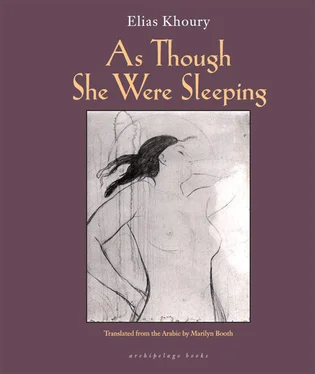What do I say about what?
About taking a bath. About you bathing and me watching.
Watching!
He said he wanted to see her in the bath because of Abu Nuwas’s poem.
Yallah , get yourself up and go to work! I have a lot of work to do today, too.
He didn’t ask her what she meant by a lot of work . He knew she took walks alone through town. Mansour was certain the fault was his. After two short excursions through the streets of Nazareth he had stopped going out with her. Even on Sundays he left her to go on her own to mass in the Church of the Annunciation while he would lounge about, alone in the house. He didn’t quite understand the meaning of this expression — lounge about — but he figured that it was probably a fair description of the way he frittered away time on a Sunday morning at home, waiting for noon to arrive. When it finally came, he promptly poured himself a glass of arak and began grilling the meat in preparation for a vigorous drinking session that usually ended in an argument between husband and wife. It started with Mansour insisting on sex in full daylight and ended when Milia left the house, returning two hours later when Mansour would be asleep and she could clean and straighten up.
How did she bathe and when? Mansour imagined his wife as the silhouette of the bathing woman in Abu Nuwas’s poem. He saw her, a form as delicate as the water, like water falling softly onto water. He would bring his glass of arak to his lips, sip the cloudy whiteness, and launch into his performance.
She faced the breeze, her body bare
a dainty figure, wind or air
Her hand reached rippling, water-soft
to nectar in a bowl unquaffed
She saw the watcher’s eye rove nigh. .
Mansour interrupted himself. No, no! It doesn’t go exactly like that.
Her wish attained, she made to leave,
So swift her cloak she would retrieve
She saw the watcher’s eye rove nigh:
she let fall darkness over light
No, the line with naddat comes first — that means she took off , or something like it.
Her gown she dropped, let water pour,
a bashful pink her features wore
She faced the breeze, her body bare —
and then (said Mansour) comes the rest of it. And this is how it ends:
Her morning dwindles after night
Water on water falls like light
He cavorted among the lines, returning to the first one and then skidding all the way to the final line, skipping ahead, jumping back, rising above the water and plunging into it as if he were swimming. Poetry is water, he said, and a woman’s body is water. Love is water and God sits on a throne of water. And — Mansour would add — He made us from water, every living thing.
He would jump ahead to steal from the woman of the parted lips a kiss she was concealing or a word she was about to say. Suddenly he would find himself at the end of his forces. I am the bearer of passion, like in the poem, he would say. It’s exhausting to be a bearer of passion. At that point, Milia got up and went to the kitchen, where he followed her. This is arak, woman, real arak, ya Latif what arak does to a man! White upon white. Ten out of ten. That’s what arak is, ten out of ten.
Milia did not understand why her husband was so consumed by a single thought, leaving him oblivious to all else. Why could he not see how much of a stranger she felt herself to be here, and how alone she was? Sometimes, she felt truly afraid. . but no, Mansour was not like that, he was not like certain other men. But fathers do kill their sons, she had always believed. Well, no, not always: she had believed it because her father told her so. Well, no, actually, her father did not tell her anything of the sort, perhaps he did not tell her anything at all. But it was the family story, after all, and this story had not been buried along with her father at his death. For the image of Salim the Elder, the grandfather, lingered: indeed, it occupied center stage — even when their father grew to be so like his father. As Saadeh said to her children, though, the image of the victim never disappeared from Yusuf’s face, with its deep dark clefts and the half-closed eye.
Can the father really kill his son? she asked her grandmother.
No, my girl. He didn’t mean to kill him. He hit him with the rock because he didn’t recognize him.
How can that be? How can a father not know his son?
His father thought he was someone else. He thought it was a thief and so he threw a rock at him. It isn’t the fault of either the father or the son. It was the circumstances. Those days were tough ones, my dear, and most likely it was the woman’s fault. She created the problem and we inherited it after she died. Your grandfather Salim bought the house. That was the real problem — the house. Your papa tried first to sell it but he couldn’t. To sell it, he had to find someone to buy it, but in those days there was no money around. So Yusuf — and all of you with him — were stuck with the house. Your grandpapa didn’t intend to kill his son — that’s just chatter from that nun your mama follows around and repeats as if she’s a parrot. No, that sort of twaddle! Can’t possibly be right. Enough talk.
On the night when pregnancy filled her and she entered that sovereign realm of the dual, Milia decided to begin her life all over again. But then, all of a sudden, where had the specter of Najib come from, and why? Why had Mansour yanked it out of the cave of memory?
Mansour had married this young woman for love, and he tried to explain to her the meanings of love. He had believed she was as much a lover as he was but simply could not find the words to express her love. And so, he borrowed poetry and rolled it out like a lush carpet before her feet. He said that far back in the eighth century Bashshar b. Burd described love when he wrote his body into his lines of poetry.
Take my hand, lift my robe, and you will see:
spent is the body my wrappings enclose
What runs now from my eyes are not my tears
but a soul that melts and in melting, flows
He was wolfing down the plate of eggs in the hotel dining room when she came over to him. She lifted the plate away from his hands and passed it to one of the Wadiias, saying it was bad for his health.
I’m fine now, and that’s all over and done with, he said.
No, you aren’t fine yet, she said.
Fine, but didn’t you see what a tiger I was last night?
Last night!
I hope you’re just pretending you don’t understand.
What I do understand is that you must pay attention to your health. We must go back to Beirut — where’s the chauffeur?
He told her he had paid the fare and the driver had eaten his breakfast and left for Beirut.
And us?
We’re going to stay another two nights and then we’ll make our way down to Beirut and from there to Nazareth.
No, we have to go today, it’s very cold.
She sat down across from him, ate a little cheese, drank a glass of tea, and saw how the man devoured everything on the table in front of him. Milia was hungry but she knew that faced with her husband’s exhaustive appetite she would eat only sparingly, satisfying herself by observing him as he exclaimed over her stunning cooking. A day would come when he would call himself the first man in the world to prefer his wife’s cooking to his mother’s. Listening to him, she would wonder about her three brothers in the ancient house in Beirut who were having to get reaccustomed to their mother’s bland dishes. She would think of them, but the disturbances in Palestine had closed the roads and letters did not arrive. That is why she decided to talk with her brother Musa in her own special way. When Mansour left for work and the house was empty, she would call for Musa and he always came. She asked him questions and he always answered; she saw him there in front of her. She complained to him, too. She was so alone, she said, and so afraid, and she longed for the scent of the lilac trees in their family garden.
Читать дальше












